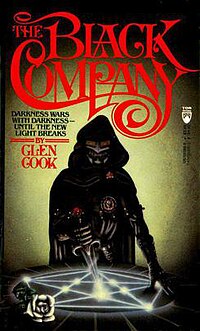 One of the key plot points of J.R.R. Tolkein's masterpiece, The Lord of the Rings, is the fact that Frodo FAILS. He does not, in the end, prove capable of withstanding the Ring's evil call to selfish security. In the end, Frodo claims the Ring for his own and it is only random chance (or rather, the mysterious workings-out of a higher power) that destroys the Ring once and for all.
One of the key plot points of J.R.R. Tolkein's masterpiece, The Lord of the Rings, is the fact that Frodo FAILS. He does not, in the end, prove capable of withstanding the Ring's evil call to selfish security. In the end, Frodo claims the Ring for his own and it is only random chance (or rather, the mysterious workings-out of a higher power) that destroys the Ring once and for all.The lure of the Ring is greater than any mortal's ability to resist. Or immortal's, for that matter; neither Galadriel nor Gandalf dare even touch it. They understand the meaning of the phrase "To rule them all."
The Ring is "the ultimate machine" -- it is the answer to any problem. To every problem. It is Solution incarnate, whispering the promise of how wonderful things could be. If only that one little niggling detail could be hammered down.
And oh how tempting that promise is to me. How often I fall prey to the succubus notion of fixing the problems in my life, when the truth is that the problems in my life are not fixable in any normal sense of the word.
Steven Erickson has pointed out how profoundly the fantasy genre shifted when Glenn Cook published The Black Company. While I would include Steven Brust as the opposite axle of that shift, I'm on board with Erickson's interpretation of Cook's work and impact. Both writers emerged in the early-to-mid 80's so let's call it a draw. Both inverted Tolkien's norms (which by the mid-80's had become deeply entrenched in genre writing) in playful, modernist and profound ways. In both author's hands, the fantasy genre at last began to transcend the boundaries Tolkien's immense genius had placed around it.
I was walking home the other day and thinking about the fantasy genre and why we tell stories full of magic and swordplay and desperate quests. And most particularly, why fantasy stories almost always seem to revolve around ancient evil left to revive itself and trouble the world once again.
Brust's stories don't, but he's a genius. Moving on.
Tolkien in a way creates this trope, and its ubiquity in the fantasy genre is as much a testament to the power of his mythological restoration as to anything else, but it remains a striking trope and it probably deserves some coherent analysis. Which, sadly, I am uninclined to offer.
 What I did end up thinking about was how Cook inverts this element of Tolkien just as he does the elements of innocence, high language, careful history and culture and so on. At the close of the series (the first trilogy), the rising evil has been put down again, but whereas in Tolkien the evil is finally once and for all destroyed through the power of grace (or coincidence, if you prefer), in Cook there is no grace to deliver us. There is no higher power that awaits one who will make the final sacrifice in order to ensure the safety of the rest.
What I did end up thinking about was how Cook inverts this element of Tolkien just as he does the elements of innocence, high language, careful history and culture and so on. At the close of the series (the first trilogy), the rising evil has been put down again, but whereas in Tolkien the evil is finally once and for all destroyed through the power of grace (or coincidence, if you prefer), in Cook there is no grace to deliver us. There is no higher power that awaits one who will make the final sacrifice in order to ensure the safety of the rest.In Cook, there is no Solution to the Solution.
Evil gets hammered down and people make sacrifices in order to encourage safety, but in Cook's world there is no surety. Evil always waits. It always finds a way back, as long as there exist people who are willing to screw over their fellows for an advantage.
The Third Age ends and the threat of Sauron is gone. The final servant of Morgoth is destroyed and the world is at last safe for mortal souls.
The White Rose and the Lady square off over the Dominator and the world is NOT safe. It is no safer than it was. No Age comes to an end, no final solution is arrived at.
Cook's is a perspective that comes after too many wars have been fought to end war. Too many efforts to solve all problems. Too many Final Solutions. Not only is there never One Ring To Rule Them All, but there is never an end to Rings and those who wish to Rule Them All.